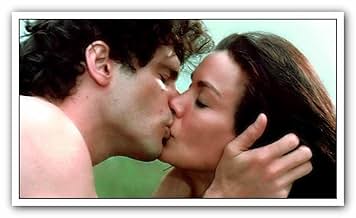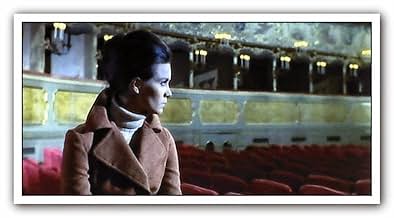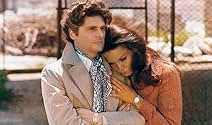NOTE IMDb
6,8/10
1 k
MA NOTE
Ajouter une intrigue dans votre langueWithout mentioning the reason, Venetian musician Enrico invites his ex-wife Valeria to visit him, and her heart is broken again during their last days together.Without mentioning the reason, Venetian musician Enrico invites his ex-wife Valeria to visit him, and her heart is broken again during their last days together.Without mentioning the reason, Venetian musician Enrico invites his ex-wife Valeria to visit him, and her heart is broken again during their last days together.
- Réalisation
- Scénario
- Casting principal
- Récompenses
- 4 victoires et 3 nominations au total
Avis à la une
Hopefully you will get the Italian version with subtitles.
Some people say this movie is about a dying musician. I disagree. This movie is all about humanity, and the errors we make in our youth.
If we could have recorded every minute when we fell in love , every gesture, every smile and every Kiss, then maybe we wouldnt have to remind ourselves why we fell so deeply in love.
In this case the musician has a terminal disease, however life in its immense sarcasm and cruelty, reminds him , and the love of his life, how small and stupid as a species we are. And how , so many small mistakes lead to desperation and sadness.
The astonishingly beautiful scenery, the most romantic music, the live drama are just perfect. Its European cinema at its best. No need for special effects or expensive sets. The city itself provides everything needed. Pure acting is all that is required, and both actors deliver superb performances.
It is the type of movies that shakes depressed souls and hopelessly romantic individuals like myself. Life can be beautiful one moment yet tremendously cruel the next. Lets not give it a chance to destroy us earlier than necessary. It is a fact of life, though , eventually we will all end up alone, miserable with just our memories.
A must for couples that want to rescue their love. And a warning for the rest of mortals so they dont fall down into the well of total and inconsolable desperation.
ps. Never visit Venice in the summer. Wait for the fall, or winter, you will fall in love with the unforgettable city like no other.
Some people say this movie is about a dying musician. I disagree. This movie is all about humanity, and the errors we make in our youth.
If we could have recorded every minute when we fell in love , every gesture, every smile and every Kiss, then maybe we wouldnt have to remind ourselves why we fell so deeply in love.
In this case the musician has a terminal disease, however life in its immense sarcasm and cruelty, reminds him , and the love of his life, how small and stupid as a species we are. And how , so many small mistakes lead to desperation and sadness.
The astonishingly beautiful scenery, the most romantic music, the live drama are just perfect. Its European cinema at its best. No need for special effects or expensive sets. The city itself provides everything needed. Pure acting is all that is required, and both actors deliver superb performances.
It is the type of movies that shakes depressed souls and hopelessly romantic individuals like myself. Life can be beautiful one moment yet tremendously cruel the next. Lets not give it a chance to destroy us earlier than necessary. It is a fact of life, though , eventually we will all end up alone, miserable with just our memories.
A must for couples that want to rescue their love. And a warning for the rest of mortals so they dont fall down into the well of total and inconsolable desperation.
ps. Never visit Venice in the summer. Wait for the fall, or winter, you will fall in love with the unforgettable city like no other.
Only two actors ,and it is much to their credit to sustain our interest throughout ;Florinda Bolkan was a beauty legend of the Italian cinema and American Tony Musante often worked in both country (notably in the excellent Dario Argento 's thriller "l'ucello dalle piume di cristallo"1967) .
It could be a mushy melodrama, it's a delicate treatment of the last day of a couple :they were married ,but even after divorce ,something remains who strangely looks like love ; not dwelling on the sordid side of live, the truth about the ex-husband is only revealed at the 50 th minute ( the pills and the injection disconcert the viewer though ).
It's a wandering through Venizia , Enrico taking his ex-wife to places when they were deeply in love ;and however ,he was not a faithful husband ,it's really a warts-and-all depiction(Enrico throws away the bouquet) inside a romantic journey through the past.
The parallel between dying Enrico and the town itself sinking and turning into silt has always been used , but here it's done in a tasteful way ;for a man without a future, who is afraid of dying in his sleep , clinging to memories is the only thing left to him ; the future is only this child , he won't see growing up, but who maybe will play his records (hence the gift ).
The music bears more than a distant resemblance to Francis Lai's score for "love story";as both movies were made at about the same time, it's probably a coincidence .
It could be a mushy melodrama, it's a delicate treatment of the last day of a couple :they were married ,but even after divorce ,something remains who strangely looks like love ; not dwelling on the sordid side of live, the truth about the ex-husband is only revealed at the 50 th minute ( the pills and the injection disconcert the viewer though ).
It's a wandering through Venizia , Enrico taking his ex-wife to places when they were deeply in love ;and however ,he was not a faithful husband ,it's really a warts-and-all depiction(Enrico throws away the bouquet) inside a romantic journey through the past.
The parallel between dying Enrico and the town itself sinking and turning into silt has always been used , but here it's done in a tasteful way ;for a man without a future, who is afraid of dying in his sleep , clinging to memories is the only thing left to him ; the future is only this child , he won't see growing up, but who maybe will play his records (hence the gift ).
The music bears more than a distant resemblance to Francis Lai's score for "love story";as both movies were made at about the same time, it's probably a coincidence .
What we see here is a rather strong, yet very human, representation of how love truly operates in many people's lives: It sinks its claws into one's essence, making him/her or both leery about what such love could bring and how it could evolve itself. I'm talking about fear, fear of abandonment, being cognizant of the fact that, unfortunately, many situations do not last forever.
The above comment was by me laid out mimicking Enrico's cynicism, not only because of his terminal disease, but due to his awareness of what explained above. Their love explodes, rather than blossoming, a true love I shall say, the love two persons are ready to promise to each other no matter what the odds in life may be. Unluckily for many, such drive (which was not sexual on either side in my opinion) walks its path along with an unwanted travel mate, fear, which deals its lethal blows to a lot of relationships due to past wounds and human vulnerability.
Valeria, notwithstanding her "so-called" new life, shows her devotion to Enrico throughout the entire movie, accepting his behavior, knowing what that really means, knowing that he was acting out of pain, sorrow and FEAR. After all. at one point in the movie, as he angrily throws his briefcase up in the air after disclosing his doom to Valeria, Enrico does say "All of this is happening and I should not be scared?".
Through Salerno's camera, Tony Musante portrays, via his character, the filth and mud he says Venice is made of, a city that sank in the water a very long time before; he admits, by way of his actions and words, to have become part of that squalid scene.
Being human though also implies hope, current or lost that it may be, which we notice only once when he says "There's still a lot of poetry in life" before taking Valeria to purchase a brocade tailor made dress. I won't comment on his citation of Proust Unlike (always in my opinion)Morricone, Stelvio Cipriani creates more of a one-to-one musical situation in the movies accompanied by its scores (e.g., L'ultima neve di primavera, Dov'è Anna et al), where the sounds, always rather somber, act as a narrator while the characters perform.
Musante and Bolkan were a perfect match, as their figures portray "Man and Woman", with every related quirk and problem, underpinned, however, by a love that will never end. Valeria realizes he really always loved her once it becomes obvious to her that he really needed to see her before dying, also when he prompts her to go before missing her last train to Ferrara. Sadly for her, the train she really missed had left Venice 7 years before from a track that only brought it back to her for a few hours that day only, to see it depart again, this time, toward a point of no return.
Valeria will carry on painfully, as she truly always loved Enrico.
The above comment was by me laid out mimicking Enrico's cynicism, not only because of his terminal disease, but due to his awareness of what explained above. Their love explodes, rather than blossoming, a true love I shall say, the love two persons are ready to promise to each other no matter what the odds in life may be. Unluckily for many, such drive (which was not sexual on either side in my opinion) walks its path along with an unwanted travel mate, fear, which deals its lethal blows to a lot of relationships due to past wounds and human vulnerability.
Valeria, notwithstanding her "so-called" new life, shows her devotion to Enrico throughout the entire movie, accepting his behavior, knowing what that really means, knowing that he was acting out of pain, sorrow and FEAR. After all. at one point in the movie, as he angrily throws his briefcase up in the air after disclosing his doom to Valeria, Enrico does say "All of this is happening and I should not be scared?".
Through Salerno's camera, Tony Musante portrays, via his character, the filth and mud he says Venice is made of, a city that sank in the water a very long time before; he admits, by way of his actions and words, to have become part of that squalid scene.
Being human though also implies hope, current or lost that it may be, which we notice only once when he says "There's still a lot of poetry in life" before taking Valeria to purchase a brocade tailor made dress. I won't comment on his citation of Proust Unlike (always in my opinion)Morricone, Stelvio Cipriani creates more of a one-to-one musical situation in the movies accompanied by its scores (e.g., L'ultima neve di primavera, Dov'è Anna et al), where the sounds, always rather somber, act as a narrator while the characters perform.
Musante and Bolkan were a perfect match, as their figures portray "Man and Woman", with every related quirk and problem, underpinned, however, by a love that will never end. Valeria realizes he really always loved her once it becomes obvious to her that he really needed to see her before dying, also when he prompts her to go before missing her last train to Ferrara. Sadly for her, the train she really missed had left Venice 7 years before from a track that only brought it back to her for a few hours that day only, to see it depart again, this time, toward a point of no return.
Valeria will carry on painfully, as she truly always loved Enrico.
10cerbu
beautiful movie, amazing how the ugly present( filmed in the fall -a decaying, dying Venice) contrasts with a bright, happy, past( filmed in the summer). Musante and Bolkan are great, running the whole gamut of emotions from whispers to screams, from laughter to tears, from sarcasm and blunt wickedness to compassion and love. one more thing. the music. morbidly beautiful.
don't see the English version, try to find the Italian one( both actors sound a lot more convincing in Italian-could be the accent). hopefully this can be digitally remastered, as the sound and the color really spoil the picture.
If you liked this one, try also Bobby Deerfield, somewhat similar.
don't see the English version, try to find the Italian one( both actors sound a lot more convincing in Italian-could be the accent). hopefully this can be digitally remastered, as the sound and the color really spoil the picture.
If you liked this one, try also Bobby Deerfield, somewhat similar.
for me, one of the special films. maybe, the most special. maybe, because its trace across memory is a ball of emotions, states, revelations, soft and bitter poetry, because it is a love story who, for long time, could represent , for me, the love story of my parents, for Venice who has a veil of surrealism , for the great music, off course. a film like a refuge. because , viewing it, you has the impression to escape by the time. it is not easy, or fair , to explain. but after you see it, it exists the feel to be part of an experience. sad, strange, dark, profound bitter. but an experience who defines you. so, a special film. for dialogues, for refined poetry of images, for the silence moments. and for something who, after decades, remains a precious secret.
Le saviez-vous
- AnecdotesBoth Tony Musante and Florinda Bolkan had all their dialogue re-dubbed, since neither was a native Italian speaker; Musante was American and Bolkan is Brazilian.
- GaffesWithin the first 5 minutes of the movie, the clocks at the station show different hours: 7:50 while Enrico is smelling the flowers, 9:25 when the train arrives and 6:40 when Valeria and Enrico leave the station.
- Versions alternativesIn Spain the movie has more than 3 minutes excised off. This version is still the one shown on TV and Home Video. It has one full scene missing (the one with Musante playing a game with a bunch of school boys), brief cuts concerning glimpses of nudity and an abrupt cut when the couple walk through the train station at the very beginning.
- ConnexionsReferenced in Brasil em Cannes (1971)
- Bandes originalesLa 5ª Sinfonia di Beethoven
Composed by Ludwig van Beethoven (as Beethoven)
Conducted by Giorgio Gaslini
Meilleurs choix
Connectez-vous pour évaluer et suivre la liste de favoris afin de recevoir des recommandations personnalisées
- How long is The Anonymous Venetian?Alimenté par Alexa
Détails
- Durée1 heure 31 minutes
- Mixage
Contribuer à cette page
Suggérer une modification ou ajouter du contenu manquant

Lacune principale
By what name was L'Adieu à Venise (1970) officially released in India in English?
Répondre




















